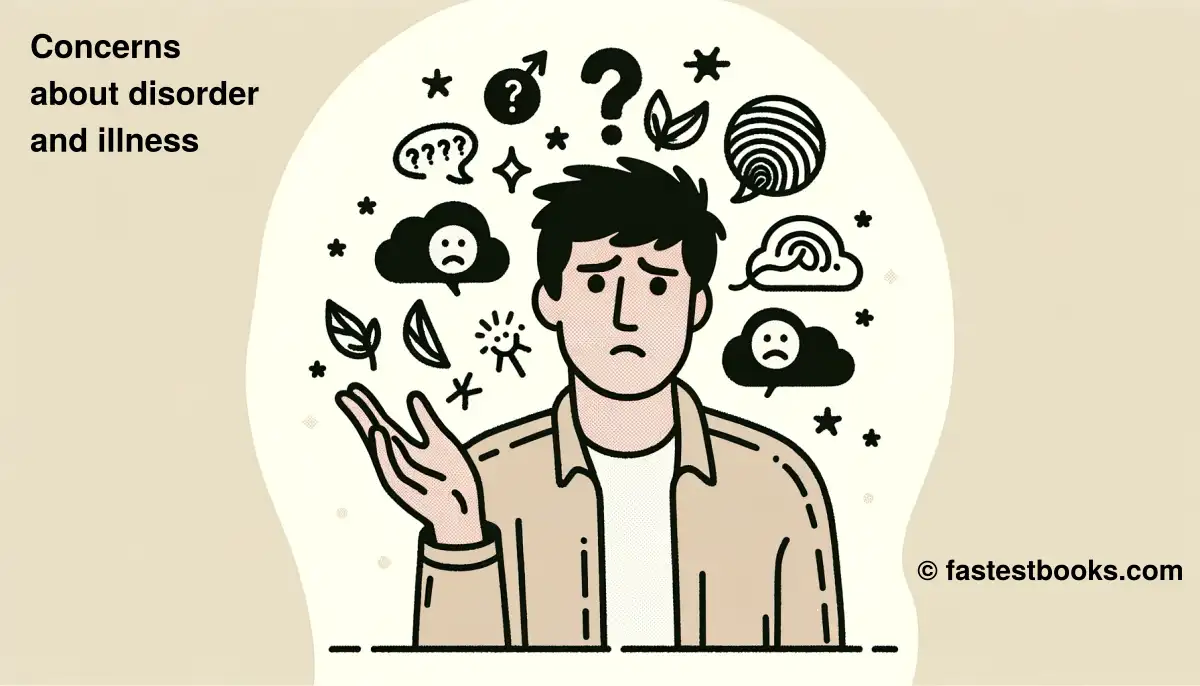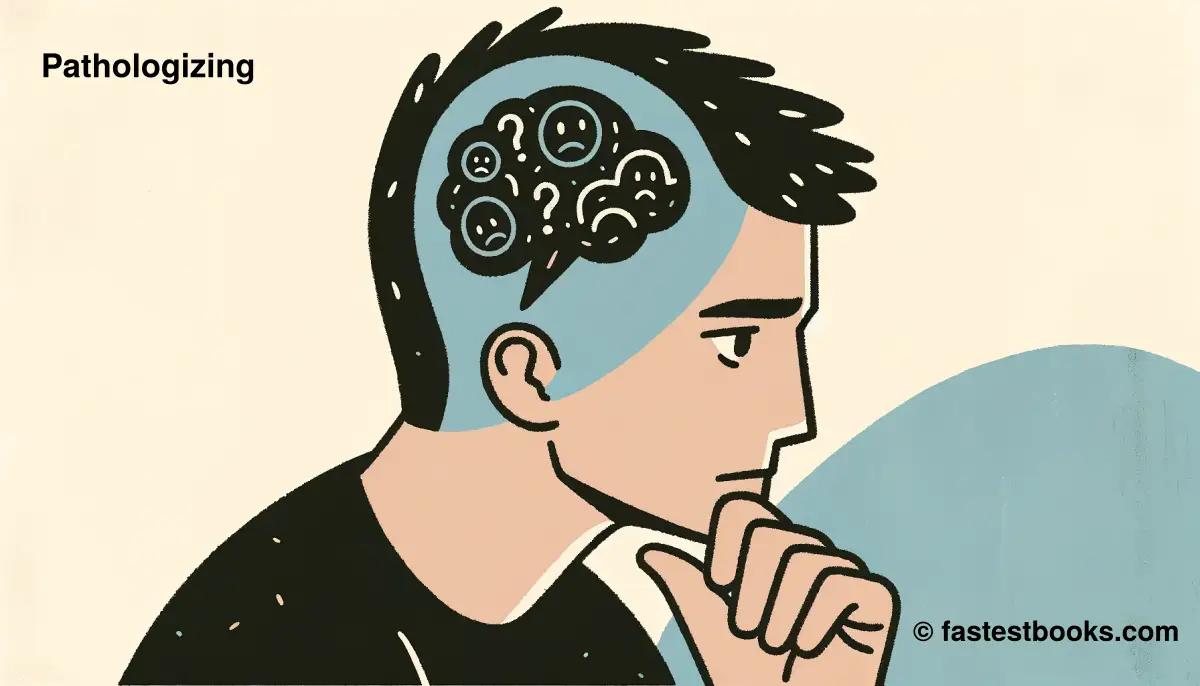
Unmasking the Dangers of Pathologization / Medicalization: A Closer Look at Mental Health Assessment
Imagine feeling overwhelmed with clutter around your house, and someone casually says, “Oh, you must have OCD!” This seemingly harmless comment reflects a widespread misunderstanding of mental health disorders, often labeling normal thoughts and behaviors as pathological. In this blog post, we will unravel the concept of Pathologization and explore how to distinguish between normal mental variations and actual disorders, promoting a more accurate and empathetic approach to mental health assessment.
Key Takeaways
- Pathologization is the process of viewing normal mental processes as disordered and can have serious consequences.
- A nuanced approach to mental health assessment promotes an accurate and empathetic understanding of individuals’ unique experiences and circumstances.
- Practical tips such as using assessment, recognition of patterns, and professional assessment can help to avoid over-Pathologization.
Understanding Pathologization in Mental Health
Pathologization behavior is the practice of characterizing a symptom as potentially indicative of an illness or disorder, usually focusing on psychological symptoms. Over time, different definitions about mental disorders have emerged due to cultural changes, which has caused discussion in the field of psychology regarding pathologization based on normal behavior. To fully grasp what pathologization entails, it’s important to take into account various elements when assessing mental health concerns.
Defining Pathologization
Mental health disorders are frequently caused by Pathologization, which is the process of classifying normal mental processes as abnormal or disordered. Examples of this include addiction, dementia, compulsive buying, and sexual deviance being viewed with suspicion instead of understanding. Accurate diagnosis and treatment require that clinicians distinguish between typical behaviors and those associated with an actual disorder. Over time psychology has evolved to now recognize potential risks in labeling regular behavior as pathological. Thus it’s important for practitioners to be able to differentiate a healthy variation from something more serious when assessing patients’ mental state. This will allow for greater insight into mental illness while reducing any potentially damaging assumptions about why people behave the way they do on a daily basis.
Historical Perspectives on Pathologization
Mental health issues and mental disorders have changed a lot over the years, based on societal values and culture. As an example of this evolution, DSM (Diagnostic and Statistical Manual of Mental Disorders) has documented many more disorders since its first publication back in 1952. This raises questions about potentially Pathologization normal responses to stress as well as having consequences for individuals & society at large. Thus it becomes critical that we take into account social context when evaluating mental illness.
The Role of Cultural Factors
The importance of cultural elements in the evaluation of mental health cannot be overstated. Culture has a huge impact on one’s understanding and approach to psychological wellness, as well as their decision whether or not to seek out treatment. Taking into consideration different perspectives and being sensitive to culture must occur when appraising any form of mental distress for more accurate results that avoid overselling an issue with medical labels.
Including diversified backgrounds while assessing and treating individuals facing mental issues is essential so we can reduce misdiagnoses coming from ignoring significant components which may contribute heavily to certain disorders. Ultimately this should lead us down a path where assessments are holistically carried out leading to better care rather than simply attempting cut-and-dry solutions without due attention given by considering all pertinent factors.
Common Misconceptions about Mental Disorders
This passage focuses on dispelling popular misconceptions about Obsessive-Compulsive Disorder (OCD) and exploring the intricate relationship between anxiety, depression, and mental health. By debunking these myths, we can gain a more complete comprehension of various disorders related to our mental wellbeing. An acknowledgement of how complex emotional distress is allows for greater empathy when considering those struggling with it every day.
Debunking OCD Myths
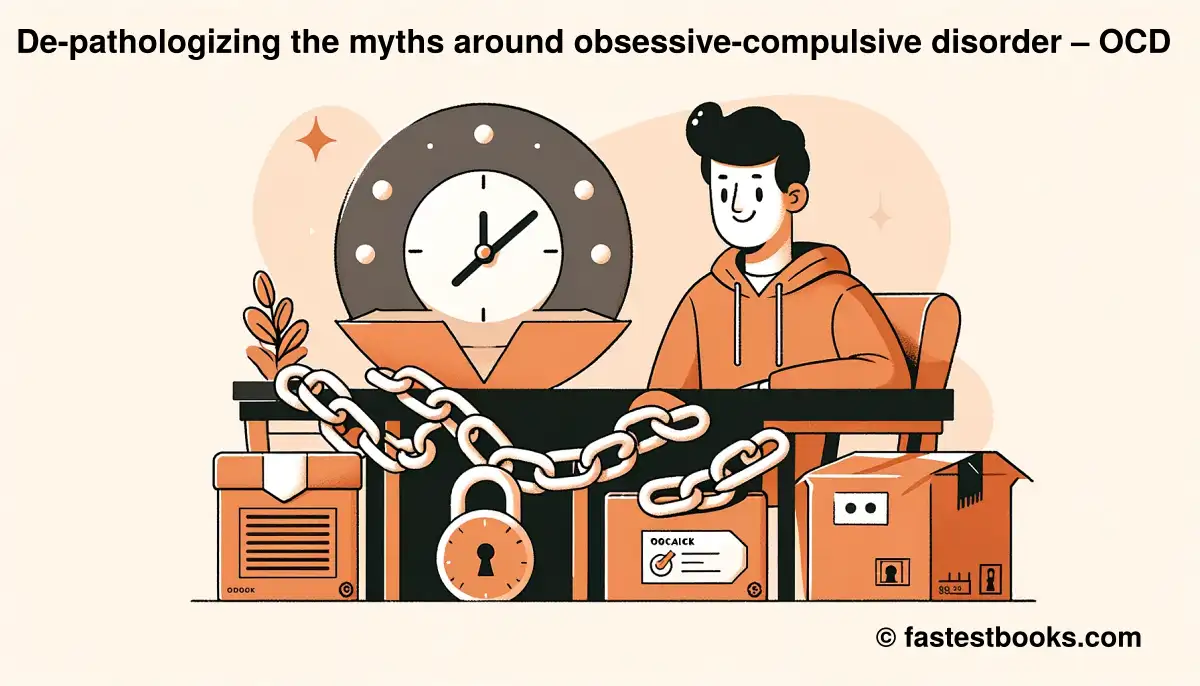
Distinguishing between regular thought patterns and intrusive ones due to OCD can be difficult but necessary in order not to fall into over-Pathologization. The neurological basis behind this mental disorder should be taken into account so our society has a better understanding of how it is different from normal thoughts or behavior. Thus making sure individuals affected get the appropriate support needed through treatment provided by specialized mental health professionals.
Dispelling these misunderstandings concerning OCD is essential when trying to create more accurate awareness which will eventually avoid mislabeling everyday ideasactions & anxious states because lacking knowledge. It’s important we look beyond surface level characteristics enabling us to foster any type of changes required to handle effectively.
Anxiety: A Double-Edged Sword
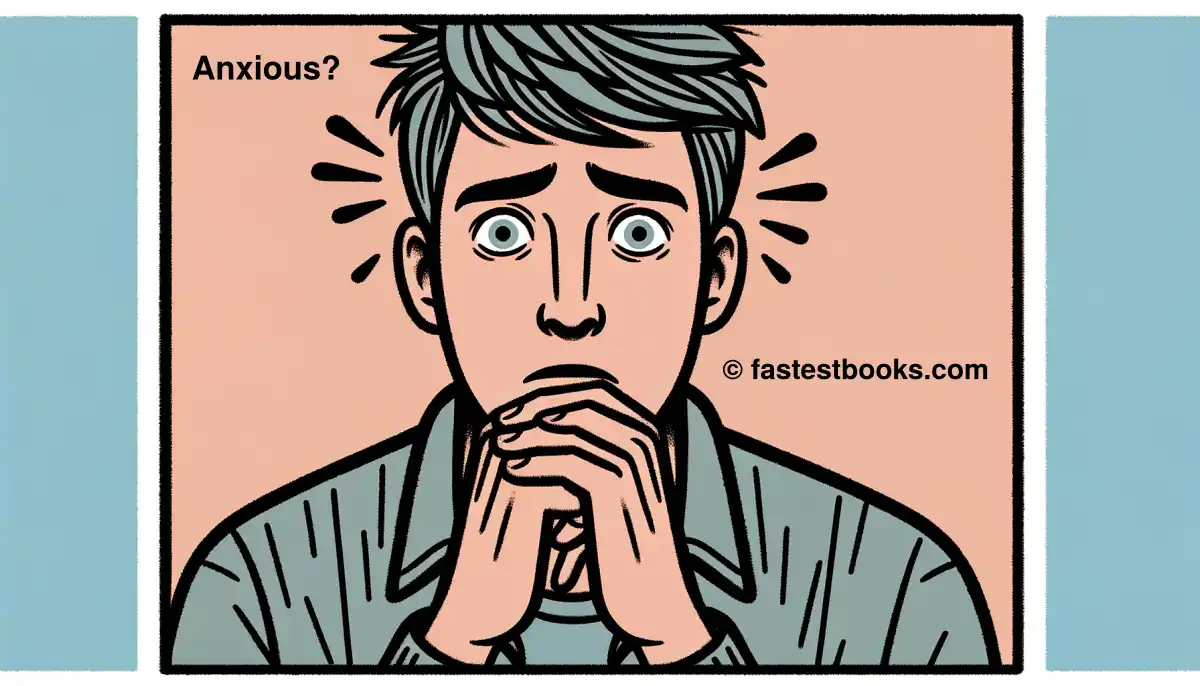
Depression: A Logical Response?
Depression is a complex mental health issue that brings pain and distress to millions around the world. It can be seen as an evolutionary solution or natural response to various hardships in life such as loss, but over-pathologization it can only result in more suffering for those afflicted and hamper any therapeutic efforts made towards them.
The importance of displaying empathy cannot be overlooked when dealing with depression. This means providing comfort, affirmation and establishing a safe atmosphere where individuals feel they are allowed to communicate their innermost emotions without judgment from others. Empathy contributes not just by helping build trust between sufferer and practitioner, but also works wonders at lowering stigma related to mental illnesses overall.
Consequences of Over-Pathologization
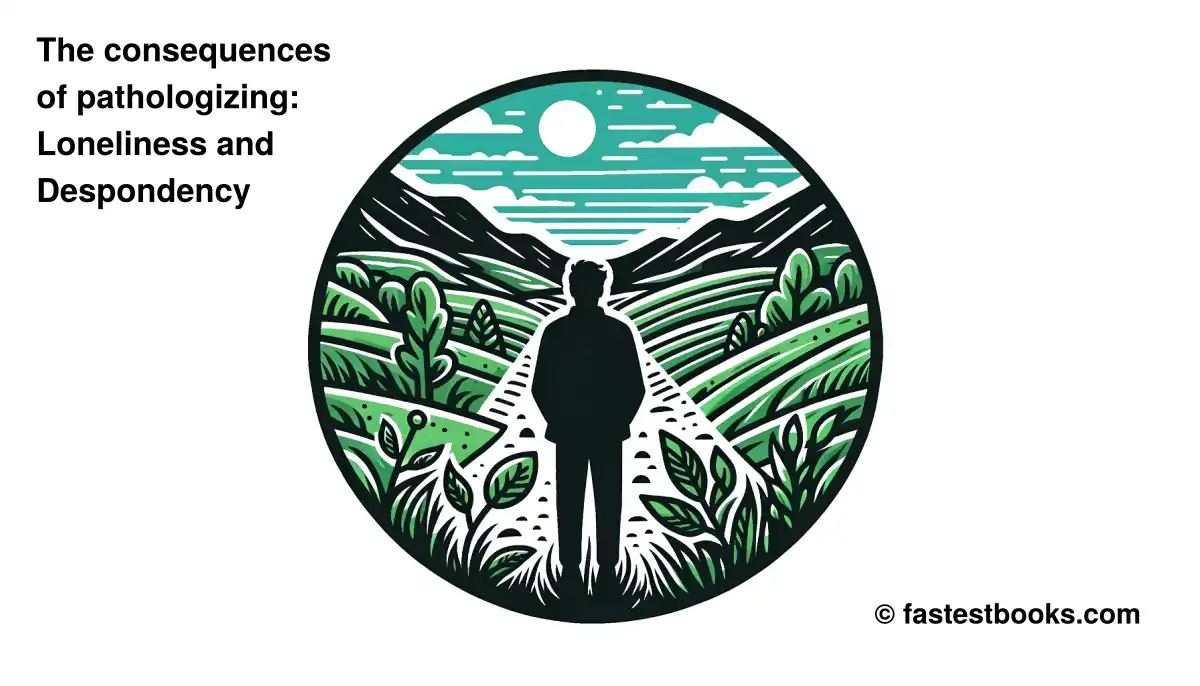
Harmful Internal Battles
Labelling routine emotions and encounters as mental illnesses can prompt an individual to internalize that something is amiss with them, resulting in self-criticism, embarrassment, and the difficulty of conforming to social standards. This can be seen as over-pathologization, which could have damaging consequences for inner battles of emotion. Examples include diagnosing ordinary reactions such as medical ailments then implementing unneeded treatment. This potentially causes individuals affected by it to assume ill roles or turn away from regular activities contributing even more intensely towards their psychological fights they confront.
Misdiagnosis and Inappropriate Treatment
Mental health issues can lead to overdiagnosis and subsequent misdiagnoses or unnecessary treatments if individuals view certain behaviors as normal but outside the range of variation. This highlights the importance of avoiding excessive medicalization through responsible language, increased knowledge in mental health matters, and guarded generalizations about complex conditions. For example, Black Americans are more likely to be diagnosed with schizophrenia while their natural emotional intensity is seen as ‘abnormal’. Reliance on heuristics may create a situation where alternative causes for observed behavior are ignored based off preconceived
Misdiagnosis and Inappropriate Treatment
Mental health issues can lead to overdiagnosis and subsequent misdiagnoses or unnecessary treatments if individuals view certain behaviors as normal but outside the range of variation. This highlights the importance of avoiding excessive medicalization through responsible language, increased knowledge in mental health matters, and guarded generalizations about complex conditions. For example, Black Americans are more likely to be diagnosed with schizophrenia while their natural emotional intensity is seen as ‘abnormal’. Reliance on heuristics may create a situation where alternative causes for observed behavior are ignored based off preconceived notions that already exist surrounding diagnoses. All this emphasizes why it’s important to take caution when making assessments into any form of mental disorder/illness so we don’t end up over-oathologization people unfairly due to its serious implications. To lessen those risks, let’s make sure our approach towards diagnosing such cases involves nuance rather than jumping right away at presumed assumptions.
Leading to a number of problematic issues, pathologization can contribute to unequal treatment in various areas such as work, education and personal relationships. This applies especially for those from specific groups affected by mental health conditions who may face marginalization, social exclusion and discrimination. To reduce stigma regarding these individuals’ experiences with their mental wellbeing, it is essential that an effort is made to challenge negative stereotypes while also ensuring the necessary support resources are available. With this kind of approach, we could help promote acceptance of all forms of mental illness ultimately leading to greater equality across life aspects pertaining to both physical and psychological health among people belonging to different backgrounds.
Distinguishing Normal Mental Variations from Disorders

Distinguishing normal thoughts from “sick” thoughts
In order to provide a more accurate and compassionate evaluation of mental health, it is important that we comprehend its complexity. This includes understanding the fact that many behaviors labelled as “pathological” are in reality normal responses to events or experiences.
We should take this nuanced approach into account when assessing one’s mental wellbeing by avoiding excessive medicalization. Instead of encouraging empathy towards individual cases while remaining aware of potential nuances within each situation.
Neuroscience Insights
Psychologists and neuroscientists have looked into how past events impact everyday behavior, leading to recognition of the normality that exists in what may otherwise be considered “disordered” traits. Through understanding both psychological and physiological components, we can assess mental health objectively without mislabeling regular thought processes as pathological. In so doing, those normal behaviors are given appropriate credit rather than incorrectly being diagnosed with a disorder.
A Nuanced Approach to Mental Health
A comprehensive approach to mental health entails being attuned to an individual’s narrative and cognizant of the cultural environment. Relying on a one-size-fits-all attitude is not recommended, as it leads to inferior treatment. Through acknowledging these factors, we can Improve access to care while reducing prejudice related to this issue in society. Ultimately leading to better comprehension of psychological issues for all involved parties. Such an enlightened point of view towards mental health will help benefit those struggling through improved understanding from within our culture overall.
Practical Tips for Avoiding Over-Pathologization
In mental health, it is important to avoid over-Pathologization and promote an accurate understanding. Strategies which can be used include assessing context and psychosocial adversity, recognizing patterns in thoughts/feelings/behaviors as well as considering the Mental Health Continuum for a reliable diagnosis. Seeking professional help ensures that each individual receives appropriate support according to their unique circumstances and aids in distinguishing between normal psychological variance versus actual disorders. This knowledge Enables treatment plans tailored towards aiding those dealing with illnesses or difficulties related to mental health.
Summary
This article has discussed the concept of Pathologization and its effects on recognizing and treating mental health issues. We highlighted that we must identify the difference between normal psychological differences and actual illnesses, while letting go of false beliefs about this topic to form a more empathetic approach. It is our hope that readers will question their biases concerning mental matters in order to advance more effective forms of assessment as well as treatment for those dealing with disorders or other types of problems related to one’s emotional state.
Frequently Asked Questions
What does it mean to pathologize someone?
Pathologization someone involves assigning a sign of mental disorder to their behavior or characteristics that do not adhere to the norm, and thereby treating them differently.
What is an example of Pathologization?
Pathologization is the practice of labeling a regular behavior, such as sadness or grief, as something which needs special attention and intervention, like diagnosing it as depression. It can also include suggesting that someone’s relationship issues are due to their mental health disorder instead of addressing them directly. Likewise for when somebody expresses distrust—this too may be attributed by some to having an underlying mental illness.
How can over-Pathologization lead to inappropriate treatment?
Leading to inappropriate treatment, if a person is viewed too much through the lens of pathology, it can lead to not taking into account their unique needs as an individual. Instead just treating them as a diagnosis.
What is the difference between everyday stress and anxiety disorder?
It is normal to experience stress in a particular situation, anxiety disorder results in an exaggerated and prolonged reaction. This kind of distress can be far more severe than everyday strain that most people commonly encounter.
What are some effective strategies for distinguishing normal mental health variations from disorders?
By examining the context and external influences, identifying patterns in mental processes such as thoughts or emotions, taking into account different levels of wellbeing according to the Mental Health Continuum Model and seeking professional advice if needed can help distinguish normal psychological variations from more serious disorders.

